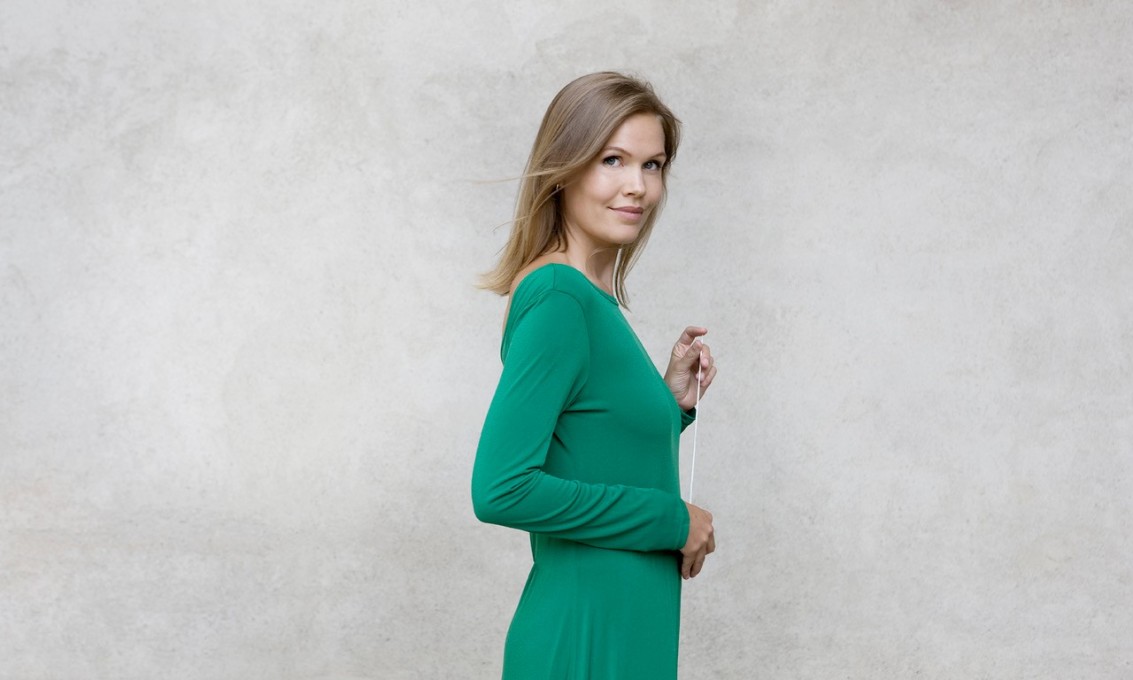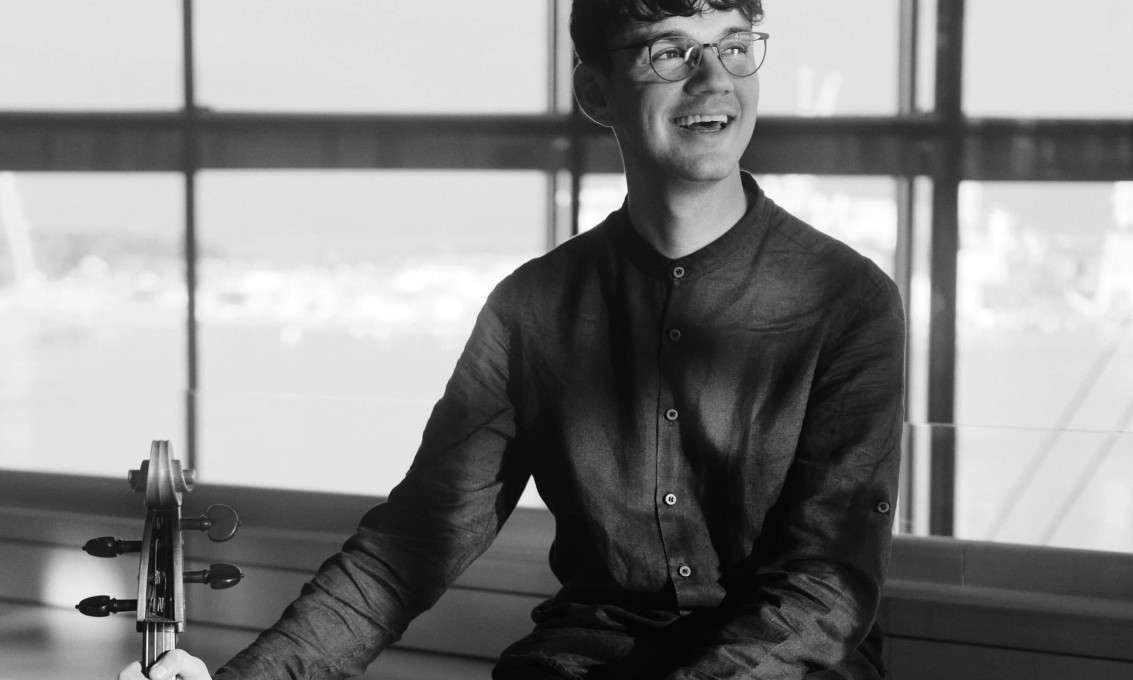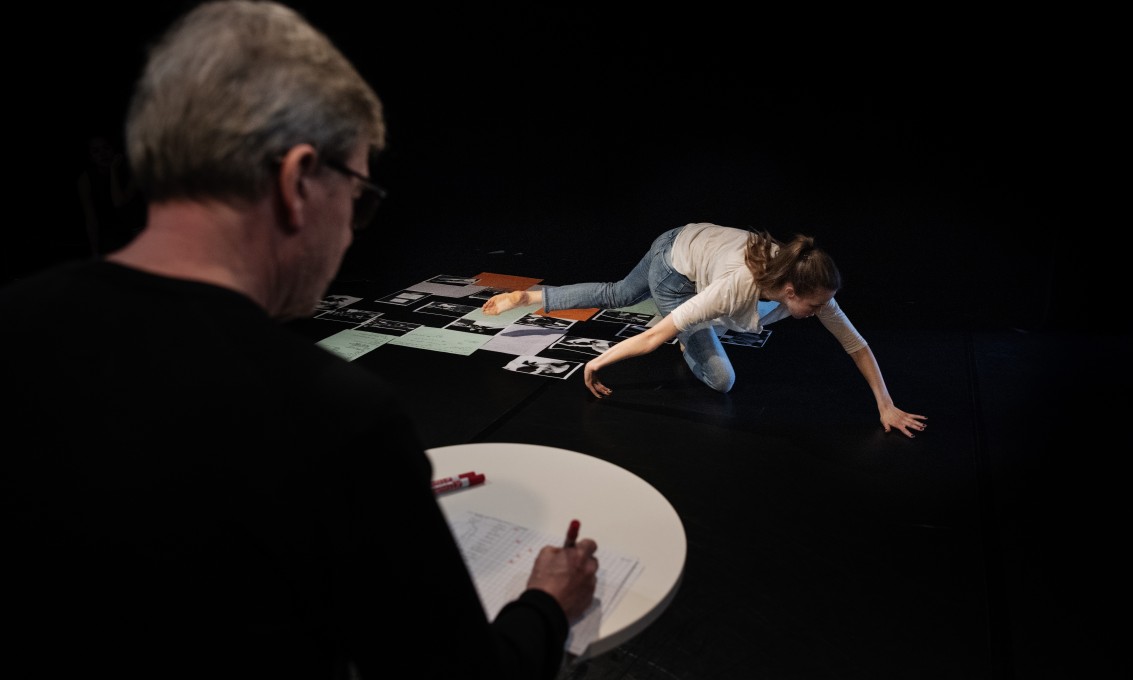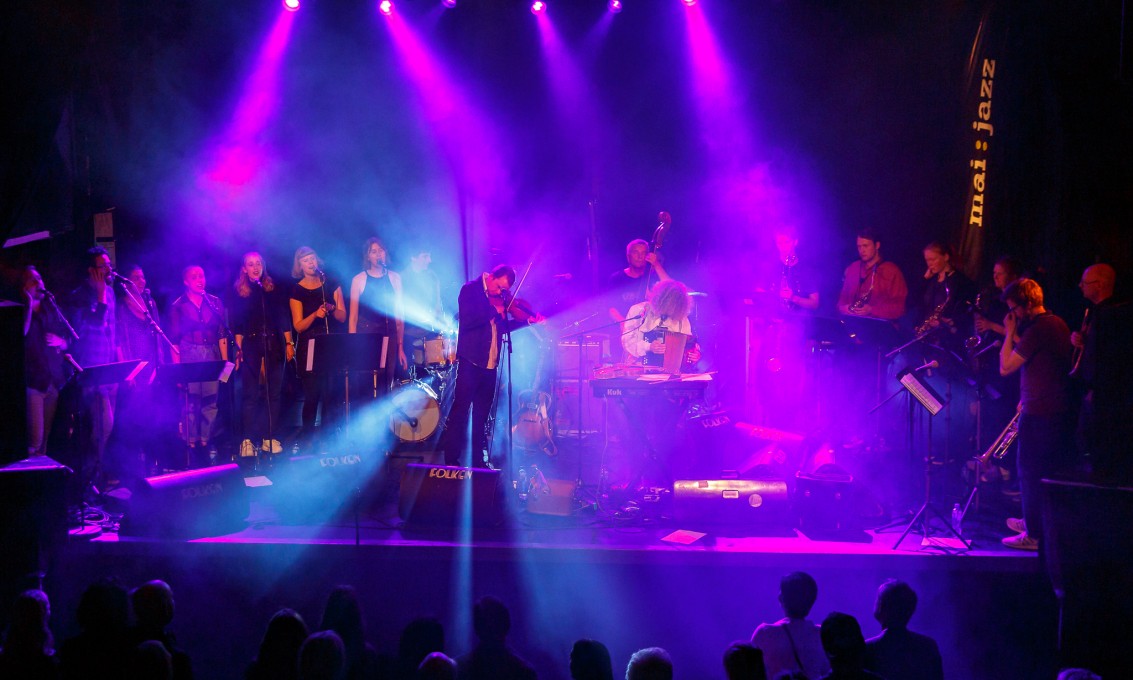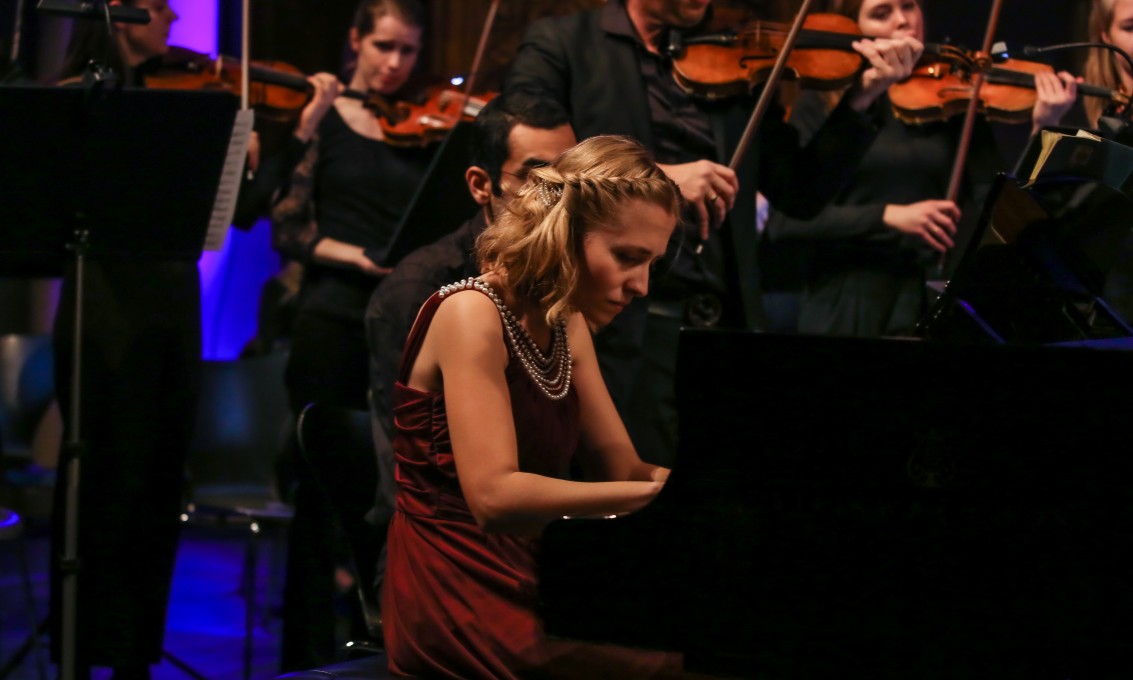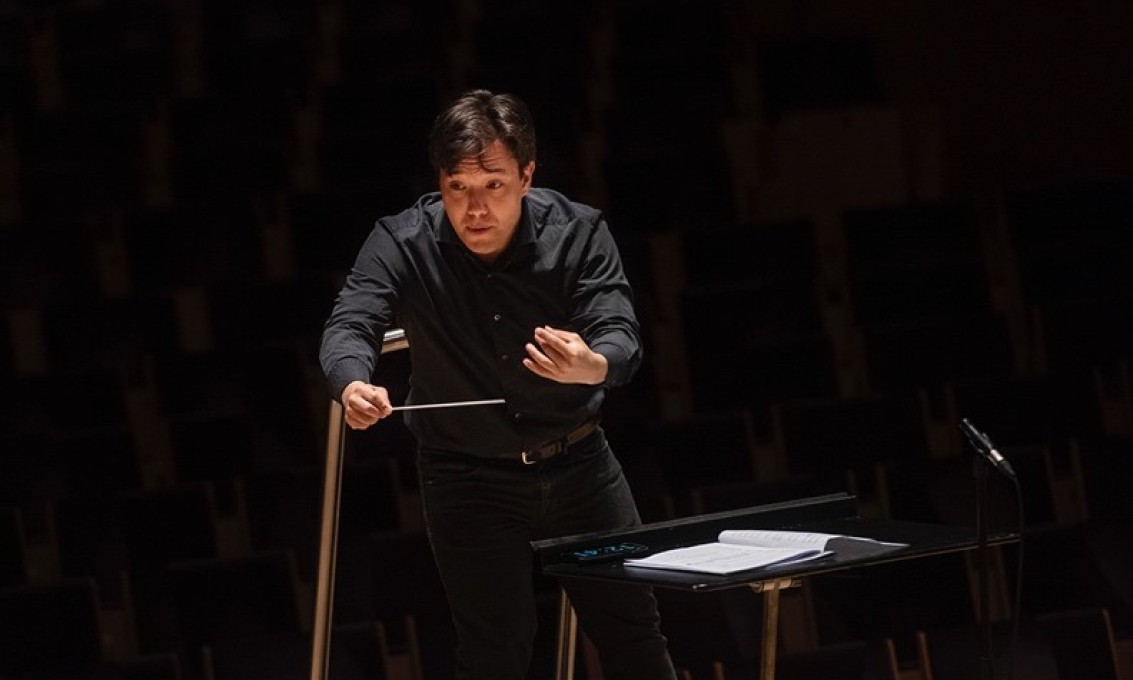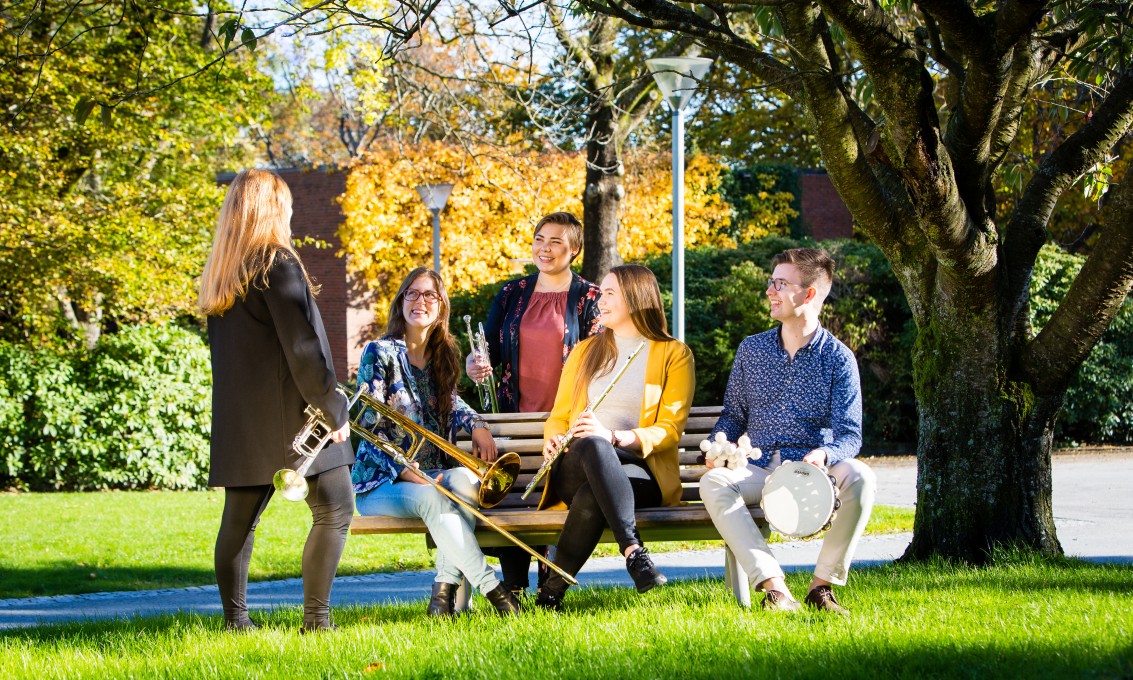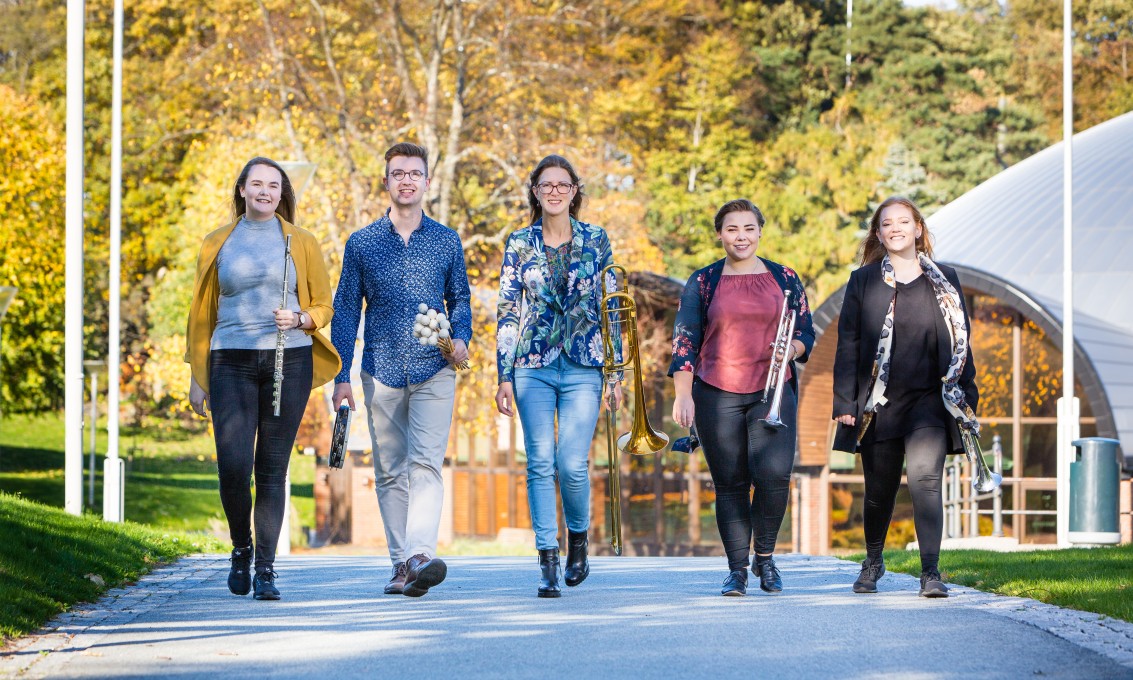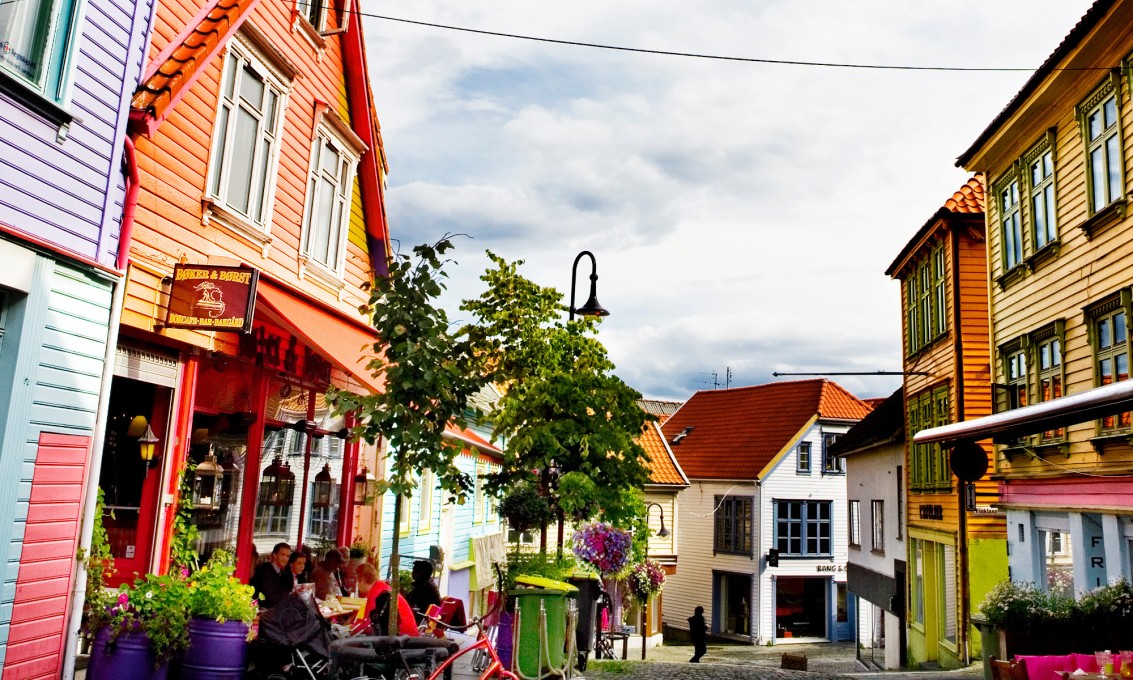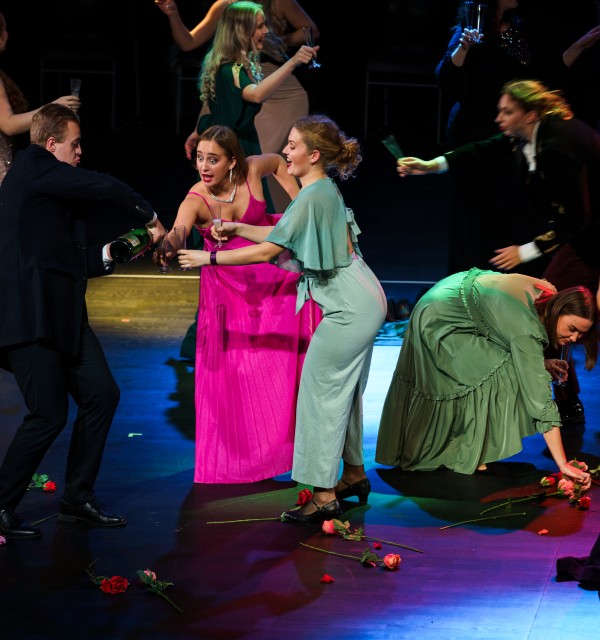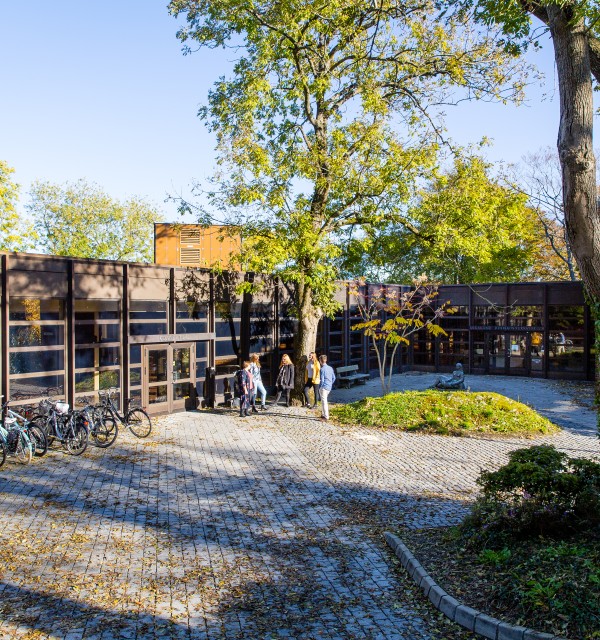This programme is suitable for those who wish to complete an in-depth study as a performing or creative artist. Our goal is for you to realise your personal artistic profile and develop your insight and skills to a professional level. This means that the programme is open to all styles and genres within the four areas of dance, classical music, conducting and jazz/improvisation.
2 years
120
Approx. 20
English
Round 1 - Project description and video Round 2 - On Campus Bjergsted week 10
15. December - Main admission
FUK UiS - association for all students at the Faculty of Performing Arts.
About the Programme
Practical artistic work is essential in the master's programme and emphasis is placed on creativity and innovation. As a student, you will acquire knowledge through lessons, supervision and independent study. Your self-defined master's project is the axis of the programme around which everything else revolves. By specialising in this, you will gain a solid foundation for developing a personal artistic expression and profile and the ability for independence and professional reflection.
Our three different subject areas give us the opportunity to operate across artistic expressions in dance and music. This is reflected in both working methods and the structure of courses. You will meet fellow students in the Master's Forum where you present to each other and receive impulses from outside via guest lecturers. You will also work on joint artistic processes in Multi-Artistic Lab. Furthermore there are opportunities for joint performance and community outreach projects in collaboration with external partners or as a student-driven activity.
But first and foremost, you will experience a discipline-based professional concentration in the programme. In addition to providing supervision by its own academic community, the faculty also facilitates meetings with Norwegian and foreign guest teachers through projects, master classes, courses, seminars and lectures.
We also emphasise that you should be able to practice reflecting on and articulate how your art practice and creation relates to society as a whole, how art engages in dialogue with current cross-cultural issues and currents in society, and what role art can address general societal challenges.
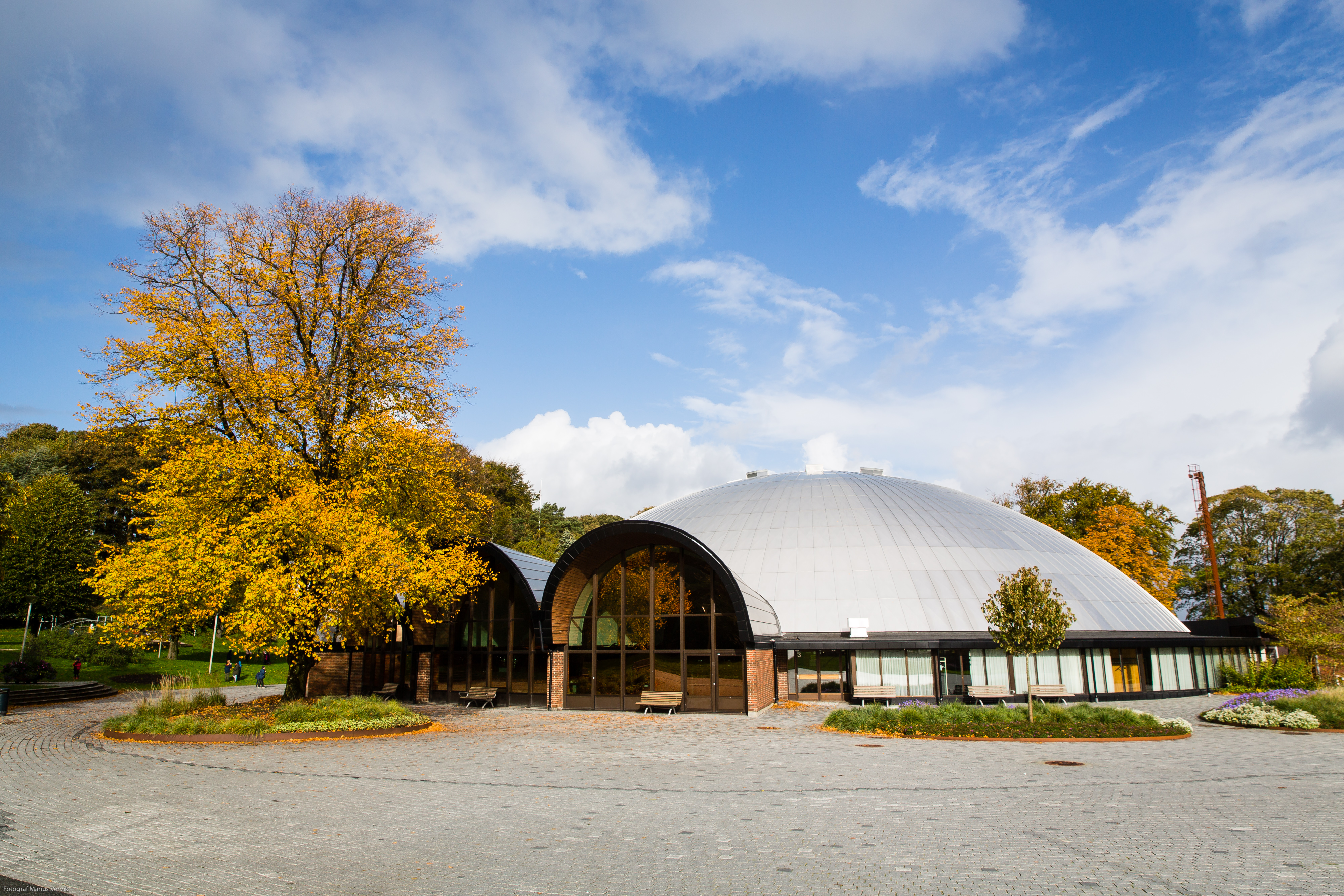
Bjergsted Culture Park
In Bjergsted Culture Park, there are close ties between the faculty's activities and the region’s professional art and cultural life. We utilise this in the parts of the programme that deal with communication, entrepreneurship and relevance to working life. You will be given tools to orientate yourself in a changing labour market. This can, for example, take place through practical projects with our many external partners. Here you will gain professional work experience and already have the opportunity to customise and build networks for your future as a performing artist or for example as a producer or curator. The faculty's partners include Stavanger Symphony Orchestra (SSO), Stavanger Concert Hall, Stavanger Jazz Forum, MaiJazz, TOU, Regional Arena for Contemporary Dance (RAS), STAR, Sandnes Cultural Centre, West Norwegian Jazz Centre, Opera Rogaland, Sandnes Symphony Orchestra, Elefantteateret, Folken, Spor5 and Forsvarets Musikk.
Very educational that UiS has such good offers when it comes to the jazz scenes in the city.
Structure of the Study Programme
The programme is offered as a full-time programme over two years or as a part-time programme over three years. Master's Specialisation I-III (60 credits) is the core subject and constitutes the independent work in the programme. Here you will work under supervision on your development as an artist and choose a specialisation in the form of a self-defined master's project linked to performing and/or creative artistic practice. The other courses are intended to support this work and the programme's final product, which is the master's project presentation in the fourth semester.
The supporting courses give you the opportunity to concentrate on specific areas of practice and expertise (Professional Context I-III, 20 credits), knowledge of working life, communication skills and the ability to place your artistic practice in a social context (Art in Society I-II, 2x10 credits), relevant theoretical perspectives and approaches (Theory in Artistic Practice and Research, 10 credits), and interdisciplinary creative impulses (Multi-Artistic Lab, 10 credits).
For full-time students, an international semester is included as an elective in the third semester.
Purely theoretical components can be completed digitally. Joint teaching in larger groups and projects with practical/performing components will be organized in blocks. This ensures that students work systematically and receive regular impulses from their own specialised environment and from the programme's interdisciplinary community, while at the same time leaving enough room for individual work and the development of their own project.
All study programmes associated with the Faculty of Performing Arts undergoe annual revisions. Revised study plan and course descriptions for the academic year 2025/2026 will be published here on 1 February, 2025.
Meet some of our former master's students
Career prospects
After completing the programme, you will be equipped to enter a versatile professional career, as a freelancer or for roles in orchestras, bands, choirs, etc.
Along with practical pedagogical education, you will be qualified for employment in schools (singing/instrumental/dance teacher or conductor in cultural schools, primary schools, upper secondary schools, folk high schools, colleges/universities).
The Master's degree in Performing Arts also gives you the basis for applying for third-cycle studies (PhD in Artistic Research).
Learning outcomes
All study programmes at UiS have defined goals for what you will learn during the course of study. Read more about the learning outcomes for this study programme.
A candidate who has completed and passed the programme shall have the following total learning outcomes defined in knowledge, skills and general competence:
Knowledge
The candidate…
- has advanced knowledge of the relevant subject area and specialised insight into their area of specialisation
- has in-depth knowledge of artistic theory and methods, research approaches and ethics
- is able to apply knowledge to new areas within the field
- is able to analyse academic issues relevant to the area of specialisation on the basis of the field's history, traditions, uniqueness and place in society.
- has gained insight into artistic practices, approaches and techniques outside their own specialisation and is able to reflect on their own artistic practice and that of others based on their own subject area.
Skills
The candidate…
- is able to realise and communicate his/her artistic choices and intentions with an independent artistic profile and a mature artistic expression
- is able to use relevant methods for artistic and/or academic research in an independent manner
- is able to analyse and relate critically to various sources of information and use these to structure and articulate professional reasoning and perspectives
- is able to engage in performing and creative outreach activities alone and in collaboration with others and carry out an independent, limited specialisation project under supervision and in line with applicable professional and research ethics standards
General competence
The candidate…
- is able to identify and relate to relevant academic, professional and research ethics challenges and opportunities
- is able to demonstrate reflection and innovation through the application of knowledge and skills in new work areas
- is able to communicate extensive independent work and masters the forms of expression within their area of specialisation
- is able to communicate and convey music or dance-related issues in a critically reflective manner, both within the academic community and with the audience
- is able to contribute to new thinking and innovation processes with artistic expertise
- is aware of quality concepts within their own art form and specialisation area
Study plan and courses
Enrolment year: 2025
-
Mandatory courses
-
Master’s Specialization I
Year 1, semester 1
-
Art in Society I
Year 1, semester 1
-
Multi-Artistic Lab
Year 1, semester 1
-
Master’s Specialization III
Year 2, semester 4
-
-
Performing Arts - Specialization
-
Dance art
-
Obligatoriske emne
-
Professional context I
Year 1, semester 1
-
Theory in Artistic Practice and Research
Year 1, semester 1
-
Professional context III
Year 2, semester 4
-
-
3.semester, courses at UiS or exchange studies
-
Courses in term 3
-
Master’s Specialization II
Year 2, semester 3
-
Professional context II
Year 2, semester 3
-
Art in Society II
Year 2, semester 3
-
-
Exchange
-
-
-
Conductor
-
Obligatoriske emne
-
Professional context I
Year 1, semester 1
-
Theory in Artistic Practice and Research
Year 1, semester 1
-
Professional context III
Year 2, semester 4
-
-
3.semester, courses at UiS or exchange studies
-
Courses in term 3
-
Master’s Specialization II
Year 2, semester 3
-
Professional context II
Year 2, semester 3
-
Art in Society II
Year 2, semester 3
-
-
Exchange
-
-
-
Jazz/improvisation
-
Obligatoriske emne
-
Professional context I
Year 1, semester 1
-
Theory in Artistic Practice and Research
Year 1, semester 1
-
Professional context III
Year 2, semester 4
-
-
3.semester, courses at UiS or exchange studies
-
Courses in term 3
-
Master’s Specialization II
Year 2, semester 3
-
Professional context II
Year 2, semester 3
-
Art in Society II
Year 2, semester 3
-
-
Exchange
-
-
-
Classical
-
Obligatoriske emne
-
Professional context I
Year 1, semester 1
-
Theory in Artistic Practice and Research
Year 1, semester 1
-
Professional context III
Year 2, semester 4
-
-
3.semester, courses at UiS or exchange studies
-
Courses in term 3
-
Master’s Specialization I
Year 2, semester 3
-
Professional context II
Year 2, semester 3
-
Art in Society II
Year 2, semester 3
-
-
Exchange
-
-
-
Student exchange
By going on exchange to one of our partner institutions abroad as part of your studies, you will have an opportunity to get a unique education. In addition to improving your career opportunities, you grow as a person and gain the ability to greater reflect on the topics you study as part of your degree.
For full-time students, an international semester is included as an elective course in the third semester (autumn semester in the second year).
Why a stay abroad?
The primary purpose of the exchange is to enable the student to further develop as a performing and co-creating artist. An international semester will give the student the opportunity for further in-depth study and specialisation in relation to the original study at UiS, especially the student's master's project. At the same time, the student will receive impulses from other academic traditions and build new, international networks. An exchange programme will enable the student to see his or her performance activities in an international perspective, engage in artistic communication in an international environment and through this gain a deeper understanding of his or her own performer's knowledge.
In the master's programme at the Faculty of Performing Arts, students gain good knowledge of international artistic environments both through their own exchange and visits from guest teachers. The programme has an international profile with staff who have international experience from several countries, and incoming exchange students are admitted annually for one or two semesters.
Organisation of the exchange
The semester is organised as an elective course of 30 credits. The content of the international semester at another institution must be based on an individual learning agreement. This will ensure a study plan that facilitates the student achieving the learning outcomes described in the course. The work and teaching methods will vary from place to place. The student follows a study plan at the visiting institution, either by joining an existing programme or by the institution organising a scheme specifically for the individual student. It is also possible for UiS students travelling abroad to construct the content of a stay abroad that is not based on an existing institutional collaboration. This programme must then be approved by the faculty management and financed by the individual student.
Students who travel abroad and complete 30 credits at the host institution will have these included in the Master's programme in Performing Arts. The elective course will replace the teaching the student would otherwise have received in the third semester. The exchange period will therefore not result in extended study time. Students can apply for an exchange place at one of the UK's many partner institutions with a view to a partial study programme abroad. Students must inform themselves about relevant courses at the relevant foreign institutions. The faculty, together with the International Office and the host institution, are responsible for ensuring that the student receives a quality-assured programme abroad that is suitable for the student's progression and planned course.
Requirements for travelling on exchange:
All courses in the first year must be passed for the student to be granted an exchange. The student must have the necessary knowledge, skills and competencies from Master's Specialization I and all supporting courses to be able to continue working on the master's project during the stay abroad. Passing all courses in the first year will reduce the chance that potential practical challenges related to different semester times abroad will cause a major delay in the entire study programme. A completed first year will also ensure that the student has the necessary artistic maturity and independence to undertake an exchange semester and achieve the learning outcomes in the course International Semester.
See where you can travel
APPLICATION INFORMATION
How to apply for Master's Degree Programme in Performing Arts
Important information for applicants applying to Master's Degree Programme in Performing Arts.
Please Notice! All information regarding the application and admission process will be updated after 1. November.
Everything you need to know about admission requirements, entrance exam, repertoire requirements, video requirements etc. can be found in the article below.
- Admission to Master's Degree Programme in Performing Arts is processed locally at the faculty
- Apply through SøknadsWeb and submit the Specification form within 15. December
- Check the admission requirements
- All necessary documents and the Specification form must be submitted within the deadline. Please see below for more information
- When you have submitted an application in Søknadweb, you can find the link to the Specification form in the application receipt. The link can also be found in the confirmation e-mail sent from Søknadsweb
- Incomplete applications will not be evaluated for admission
- All applicants applying to Master's Degree in Performing Arts must complete 2 rounds of entrance exams
- Round 1 consists of submitting a project description, as well as a self-produced video recording for music applicants. Round 2 is carried out on Campus Bjergsted in Stavanger in week 10. Round 2 is only for applicants who has passed round 1
- Applicants who have sucessfully submitted the Specification form, will shortly after the application deadline receive an e-mail with information on how to submit the project description and video
- Deadline to submit project description and video is 15. January
- Music applicants: Share project description and video links, as well as a review of what the video is containing. In addition, you share a complete audition programme for a possible round 2 together with accompanying sheet music
- Both round 1 and round 2 must follow established repertoire requirements, as well as spesifications for project descriptpion and video submission. For more information, please read Repertoire requirements Master and Round 1 - Submission of procjet description and self-produced video
- The result of the assessment of round 1 will be shared by e-mail in January/February
- If you pass Round 1, you will be invited to round 2 by e-mail to Campus Bjergsted in week 10. Round 2 consists of an entrance exam and interview with the assessment comission and the study administration.
Read more about round 2 in the article Round 2 - Entrance Exam and Interview on Campus in Week 10 - Applicants with a residence outside of Norway, Sweeden or Denmark may choose to carry out round 2 digitally instead of meeting on our campus in week 10. For more information, please read Repertoire Requirements Master.
NB! Does not apply for applicants to conducting! - The result of your application will be published in Søknadsweb no later than the end of week 11 and 12
- Higher Secondary School - Diploma and transcript of record
- Diploma and transcript of record from bachelor's degree in either music or dance
Notice: If the documentation is not in Norwegian, Danish, Swedish or English, it must be officially translated into English. Both translations and originals must be uploaded in the same PDF file - Passport copy/Documentation of change of name - Upload only the page with the photograph and name. The passport must be valid at the time of application. If you have changed your name, please provide this documentation in the same PDF file
- English language requirement - Upload the official score report as a PDF file. Read about the language requirements here.
Notice: If you plan on taking the test during spring - Upload a copy of your test registration receipt with ETS TOEFL/IELTS Academic/PTE Academic/Cambridge English Qualifications within the application deadline - Documentation of Financing (only required for non- EU/EEA applicants)
- Certificates and references if desired
If you have not yet graduated:
Please upload a confirmation from your place of study stating completion of bachelor degree during the spring semester together with a preliminary transcript.
File format:
We want you to use the PDF file format. All attachments you upload should be of your original documents (do not scan copies).
Notice! A check of the original diploma and transcript may be initiated at the beginning of the term.
In addition to submitting required documents to Søknadsweb, you must also complete and submit the electronic Specification form within the deadline.
Submitting the electronic Specification form is mandatory for all study programmes at the Faculty of Performing Arts! Incomplete applications will be not be considered for evaluation and will be withdrawn from the application system.
You can find the link to the Specification form in the application receipt from Søknadsweb. The link can also be found in the confirmation e-mail sent from Søknadsweb.
If you submit multiple Specification forms, the last submission will be prioritized during application processing.
Specification form - What to submit?
- Personalia - name, address, phone etc.
- CV - information about your musical and educational career
- Motivation letter
- List of repertoire; 120 minutes (only applies to applicants applying to the classical field)
Repertoire list - 120 minutes
Master applicants - Classical:
Classical applicants must share a repertoire list for the main instrument of their choice in the Specification form. It must show and document that you have reviewed works with a playing time of at least 120 minutes, including at least 30 minutes of chamber music.
Master applicants - Conducting:
Conducting applicants must share a repertoire list for the main instrument of their choice in the Specification form. It must show and document that you have reviewed works with a playing time of at least 120 minutes.
For master's applicants for both music and dance, round 1 consists of submitting a project description for the desired master's project. Applicants for music must also submit a self-produced video for assessment of their performance level.
You share the project description and video links in a separate online form. You will receive the link to the form in a separate email from the case officer shortly after the application deadline.
Deadline to submit project description and self-produced video: 15. January
Project description - Summary of the desired master project
Like the study programme in general, the master's project is performative in its core and identity. It should revolve around the student's main discipline. The applicant may formulate the project within a wide range of possible themes and focus areas.
In music, the project may shed light on technical, stylistic or performance practice issues, deal with a particular genre, historical era, performer or composer, or be more creatively, conceptually or pedagogically orientated. It can be traditionally or experimentally orientated.
Similarly, in the field of dance, the project may involve practices such as improvisation, performance, repertoire, choreography, community outreach, somatics, various dance genres, pedagogy, dance for children and young people, visual or textual practices.
Via your project, you can also apply with a composite or dual main discipline. To be admitted, you must demonstrate a sufficient level in both sub-disciplines in the practical test.
Regardless of what you choose, your project should have a certain exploratory character or research focus in addition to the performative part. What do you want to find out? What field would you like to explore?
The following parts must be included in the project description:
- Title and repertoire/material – the material you want to work with
- A summary of what you want to explore, what questions you ask yourself and your material
- What approach and method you want to have in your work with and development of the project (here you can optionally also state sources and references that deal with what others have done in related works)
- Suggested theoretical framework (to be developed further in dialogue with supervisor)
- How you envision the final presentation of the project in the final exam of the course
- What goal or outcome you envision, and a preliminary conclusion (a kind of hypothesis)
The summary may contain images or other visual elements that support or are part of the project.
Length: The project outline must not exceed 800 words.
Accepted language: English or Scandinavian (Norwegian, Swedish or Danish).
Attachments: Digital attachments such as video, images or sound are shared via a link to Vimeo or YouTube.
Video recording guidelines - Only applies to music applicants
Master's applicants for performing music must, in addition to the project description, submit a self-produced video recording as part of round 1. Repertoire requirements for your instrument can be found in the articles below.
- Start recording yourself well before the submission deadline
- You are allowed to deliver several different videos, for example different works/pieces/songs and different movements can be recorded separately
- You are not allowed to edit within a single movement/song (does not apply to conducting)
- The video must contain the entire audition programme for round 1 and follow the established repertoire requirements
- Information about the length of the audition programme can be found under the repertoire requirements of the instrument/field you are applying for
- Audio files alone are not accepted
- The video must be uploaded on YouTube
- The video must be of recent date, and not older than 1 November 2024
Important!
Remember to film so that we see you, preferably your face, and not least see you play/sing/conduct. Remember that it is the applicant's responsibility to ensure that all links to the video(s) work. Check that the sound is OK and that you have uploaded the file to YouTube with the settings that give us rights to play it.
Notice! There is no guarantee that all of your recorded video material will be viewed by the Commission.
If you are applying to more than one instrument/field of study (for instance jazz and classical), you must submit two seperate videos with two seperate audition programmes.
Along with the video link(s), you must also share a short summary of the submitted video material; what you have recorded on video for round 1. In addition, you share your complete audition programme for a possible round 2, as well as notes for accompanist/band.
Please notice! If you want accompaniment from the faculty, and you choose a self-composed programme, the music/songs must be easily understood and read by the accompaniment groups/band. A song must be able to be presented on 1-2 pages, like a lead sheet!
Applicants living outside of Scandinavia
If you are resident outside of Norway, Danmark or Sweden, you can choose to submit the entire repertoire requirement on video as audition Round 1 and audition Round 2 (you will be asked in Specification form). Parts of the audition programme must be recorded with an accompanist/band. If you pass round 1, you will be invited to a digital interview as round 2 in week 10.
NB! The exception does not apply to applicants for conducting.
Deadline to submit the project description and video recording: 15. January.
If the commission finds your presentation eligible for further evaluation and you pass round 1, you will be invited to round 2 for the entrance exam in week 10 in Stavanger. Round 2 consists of entrance exam in music or dance, as well as an interview. The invitation to round 2 will be sent by e-mail in February.
Music - Round 2
A 30-minute audition with an interview is set aside for each applicant, and you must be prepared to have to perform the entire audition programme. The programme is performed with the faculty's accompanist/band.
The interview commission consists of a master commission and a representative from the study administration. Your submitted summary for the desired master's project forms a big part of the basis for admission for the master's study, and during the interview you will be able to outline a possible composition of the supervisor team. As an applicant, you will also have the opportunity to explain your goals and motivation for the study together with your plans for the master's project and your area of artistic specialization.
- The Faculty of Performing Arts and our Campus Bjergsted are located just outside the center of Stavanger, in Bjergstedpark
- The entrance exam is held in the main building
- You will be notified in the invitation about a final deadline for attendance on your entrance exam day
- There will be attendance registration in the foyer in the main building
- You can find your exact time for auditions with interviews in the faculty's schedule system - the audition times are published at the end of week 9, but small changes may happen until the day of the auditions
- On the ground floor of the main building you will find several rooms for rehearsal
- The faculty offers accompanist/band to all auditions in round 2 as long as music sheets are submitted within 15. January
Applicants living outside of Scandinavia
If you are resident outside of Norway, Danmark or Sweden, you can choose to combine audition Round 1 and audition Round 2 (you will be asked in Specification form). Parts of the audition programme must be recorded with an accompanist/band. If you pass round 1, you will be invited to a digital interview as round 2 in week 10.
NB! The exception does not apply to applicants for conducting.
Dance - Round 2
Applicants who have their project description approved from round 1 will be invited to round 2 at the Campus Bjergsted in week 10.
Round 2 consists of the following:
a) the entrance exam is carried out with all applicants present:
- Presentation of the project will be carried out in a live format such as a performance lecture, workshop, performance or similar.
Duration: approx. 15 - 20 min. - Oral-practical presentation of your portfolio/CV.
Duration: approx. 5 min.
Applicants who are selected to proceed to the next part of the entrance exam, will be notified at the end of each part/day.
b) interview for applicants deemed qualified after the last performance part:
- During the interview with the professional commission, the applicant will have the opportunity to ask questions. One will also go in depth on the applicant's project description, as a component of the assessment.
International applicants residence outside of Scandinavia:
International applicants residing outside Scandinavia (Norway, Sweden or Denmark) do not need to attend physically for round 2 in week 10 in Stavanger. Instead, you can choose to have a digital entrance exam in week 10:
- Presentation of the project will then be carried out on zoom in a format such as performance lecture, workshop, performance or similar.
Duration: approx. 15 min. - Oral-practical presentation of your portfolio/CV.
Duration: approx. 5 min. - Interview
Round 1
The master's programme has a comprehensive and versatile repertoire requirement for the main instrument. All applicants must fill in an audition programme for 20-30 minutes repertoire, where at least one work must have a high degree of difficulty. The programme must consist of different styles and genres that are relevant to the instrument. The 20-30 minute programme must otherwise be representative and should be in proportion to your new specialization area.
Round 1: Record at least 15-minutes from your total 20-30-minute audition programme.
You will find important information regarding video requirements in the article Round 1 – Submission of Project description and Self-produced video. The deadline to submit the video is 15. January.
Round 2
Prepare the entire audition programme, including what was performed in the video.
The repertoire is performed with an accompanist in week 10.
Duration of the audition programme for round 2: approx. 20 - 30 min.
Read more about the entrance exam in the article called Round 2 - Entrance exam and Interview on Campus in week 10.
There are spesific guidelines for the repertoire/audition prorgamme for both Round 1 and Round 2 for the main instrument ''percussion''.
Choice of repertoire
For the auditions, you can choose between two different selections of repertoire: orchestral or soloist based. You must select one of the parts. The choice will guide the academic content in your study programme. The repertoire focus will not have consequences for any other parts of the study programme. The applicants for either of repertoire choices shall, in the event of admission, carry out ordinary study: participate in orchestral projects, soloist assignments and chamber music, as well as performing ordinary exam repertoire.
Round 1
The deadline to submit the video is 15 January.
Soloist oriented repertoire:
Recording must include at least 2 solo pieces.
Total lenght: minimum 10 minutes.
Orchestral repertoire:
Recording must include 4 orchestral excerpt + 2 studies.
Study pieces can be from typical orchestra rehearsals.
You will find important information about video recording in the article Round 1 – Submission of Project description and Self-produced video.
Round 2
Round 2 consists of a physical entrance exam and in interview in week 10 on campus Bjergsted in Stavanger. If you wish, parts of Round 2 can be performed with an accompanist.
Soloist oriented repertoire:
You will have to perform at least 2 solo pieces.
Total lenght: minimum 15 minutes.
NB: you cannot perform the same pieces as you recorded and submitted in the video for Round 1.
Orchestral repertoire:
You will have to perform at least 12 orchestral excerpt + 1 study.
NB: you cannot perform the same pieces as you recorded and submitted in the video for Round 1.
Read more about Round 2 in the article Round 2 - Entrance exam and Interview on Campus in week 10.
Please notice! Applicants residing outside Norway, Sweden or Denmark:
If you are an international applicant for classical percussion, living outside Norway, Sweden or Denmark, you can submit a new supplementary video with a set repertoire for round 2, instead of physical attendance in week 10. The supplementary video must be submitted by 20 February. The video can be maximum 3 years old. The case officer will send you a new email with a link for submitting a new video in the beginning of February.
Suggested list for soloist oriented repertoire
The repertoire list is only indicative, not mandatory.
Snare drum:
- J. Delécluse: Study no. 9
- B. Lylloff: Århus Study no. 9
- J. Delécluse: Test-claire
Timpani:
- S. Monrad: Test for timpani
- J. Delécluse: Study no. 29
- E. Keune: Study no. 142
Marimba:
- J. S. Bach: A movement from one of the partitas or the sonatas for violin
- A. Lauro: Valse Venezolano No. 3
- J. Druckman: a movement from Reflections on the Nature of Water
Suggested list for orchestral repertoire
The repertoire list is only indicative, not mandatory.
Snare drum:
- N. Martinciow: Impressions or Tchik
- J. Delécluse: Test Claire
- S. Hodkinson: Kerberos
- A. Masson: Prim or Kim
- M. Markovitch: Tornado
Timpani:
- J. Delécluse: one of the studies from Vingt études
- J. Delécluse: study no. 29
- B. Cambreling: Thor
- A. Féron: Ta'wil
- T. Ishiyanagi: Rhythm Graduatiom
- E. Keune: Study 142
- S. Monrad: Test for timpanists
Marimba:
- P. Hurel: Loops 4
- J. S. Bach: Chaconne from 2nd partita for violin (D minor)
- K. Abe: Marimba d'amore
- A. Vinao: Khan variations
- J. Druckman: Reflections on the Nature of Water
- B. Mantovani: Moi, Jeu
- Y. Sueyoshi: Mirage
Vibraphone:
- G. Burton (trans.: Errol Rackipov): Chega De Saudade
- G. Pérotin: Étude 6
- P. Hurel: Loops 2
- P. Manoury: Solo de Vibraphone
- M. Matalon: Short stories
- Donatoni: Omar, 1st movement
Multi-setup:
- B. Giner: Satz
- M. Ishii: 13 drums
- K. Volans: She who sleeps with a small blanket
- Y. Xenakis: Rebons A and B
- D. Land: The anvil chorus
Round 1
Video must be shared with the faculty within 15. January.
The video must include the following:
- Conducting two works that have a contrasting musical character. Minimum 15 minutes
- Recording of a rehersal lead by the applicant. Minimum 10 minutes
- Main instrument. Optional repertoire, with or without accompaniment. If you perform more than one piece, recording of each single piece has to be unedited. The total repertoar shall be of approximately 10-15 minutes
Notice!
- The conductor's hands and face should be clearly visible in the video
- The ensemble/ensembles should consist of mimimum five musicians on a professional level, alternatively consisting of amateurs or students at a high musical/technical level
Round 2
Round 2 will consist of auditions in conducting, interview with a commission and a pracitcal test.
Conducting audition
Applicants will conduct a chamber ensemble consisting of strings, woodwind/brass and piano. The audition will consist of both rehersal and performance.
Repertoire:
- Aaron Copland: Appalachian spring (original score from 1944 for 13 musicians)
- Jean Sibelius: Valse triste
Interview/practical test:
A part of the interview will include a conversation about the repertoire for the conducted audition as well as a practical test that may contains the following:
- Aural (chords, melodies, rhythms, correction of played rhythms and pitches in relation to a score)
- Play a score on a piano
- Instrumentation and instrument knowledge: Scope, transposing and playing techniques (band and orchestral instruments)
- Repertoire insights (band and orchestra)
- Harmonic analysis
- Musical terminology
During the interview the applicant will talk about his/her objectives and motivation for the programme. There will also be an opportunity to ask questions to the assessment commission and a representative from the administration.
Read more about Round 2 in the article Round 2 - Entrance exam and Interview on Campus in week 10.
Round 1
Video must be shared with the faculty within 15. January.
The master's programme has a comprehensive and versatile repertoire requirement for the main instrument. There aren't any spesific guidelines for the audition programme for the main instrument, but it is important that you choose the repertoire that you are most comfortable with and that highlights your musical level, regardless of which of the relevant genres it belongs to. What you have to show off is your uniqueness and personality as a musician. The programme may be self-composed, but must be representative and should be in relation to your desired area of specialization. It is assumed that the audition programme demonstrates skills in improvisation.
Duration of audition programme: 20 - 30 minutes.
Record at least 15-minutes from your total 20-30-minute audition programme.
You will find important information about video recording in the article Round 1 – Submission of Project description and Self-produced video.
Round 2
Prepare the entire audition programme, including what was performed in the video. The repertoire is performed with a band in week 10.
The faculty provides its own band for all auditions, but jazz applicants for Extension studies, Masters or PDM have the opportunity to provide their own band during round 2 of the audition if desired.
Read more about the entrance exam in the article called Round 2 - Entrance exam and Interview on Campus in week 10 .
Repertoire requirements master - Jazz/Improvisation
- The audition programme must be approx. 20 - 30 minutes long
- Round 1: send a recording of 15 minutes from your total audition programme
- Each recording (each song) should be delivered as a continuous, unedited recording that should not be more than 6 months old
- The video material must contain interaction. Exceptions can be made to this requirement if, for practical reasons, it is impossible to achieve interaction. If so, you must explain why it has not been possible
- The video material shall contain improvisation, so that you can clearly show your soloist and ensemble abilities. The extent of improvisation and the type of improvisation is up to yourself to decide, based on your musical profile and type of genre
- Together with the video material, you must submit music scores and you must submit a review of the audition programme for round 1 and round 2
ADMISSION INFORMATION
Useful information for applicants applying to the Master Degree in Performing Arts
In the articles below you will find general information regarding admission and application process.
The programme is characterised by diversity and is open to students at different stages of life, both students who have just completed a bachelor's degree and students who have already been active in working life for several years.
The study programme is taught in English and is open for applicants from the Nordic countries and internationally.
The study is open to style and genre within the four areas of dance, classical music, conducting and jazz/improvisation.
Admission to our master's programme requires that the applicant has a high level, as well as interest and great motivation to do advanced studies and develop further as a performing and creative artist.
Reservations are made that the faculty has available expertise for guidance and teaching within the applicants' chosen specialist area.
When can I apply?
Application period opens from 1. November until 15. December.
You apply locally through the application portal Søknadsweb.
Secondary admission is opened for certain instruments and studies that have available study places after the primary admission period.
Secondary enrollment is open from 15. April to 15. May.
Notice!
Our Master programme is possible as a part time study and can be completed over 3 years.
Applicants with citizenship outside the EU/EEA and Switzerland must pay tuition fees.
General admission requirements
Achieved bachelor degree
In order to be admitted to Master Degree in Performing Arts (120 ECTS) a completed Bachelor Degree in Music Performance or dance (minimum 180 ECTS) is required. At least 90 ECTS of the Bachelor programme must consist of music or dance performance subjects.
English language requirement
Language requirements in English must be passed in accordance with UiS's regulations. The University of Stavanger has its own language requirements for admission to Master Degree in Performing Arts. You can read more about how you can meet the English requirement.
Entrance exam
In addition, you must pass practical entrance exams (up to 2 rounds). A preliminary project description for the master's project based on the master's project template forms part of the admission basis for the master's programme. In connection with the practical admission tests, interviews will be held to outline the composition of the supervisory team and to give the applicant the opportunity to explain their objectives and motivation for the programme, their plans for the master's project and their artistic area of specialisation.
After the entrance exams have been completed, the heads of department and the dean make an overall assessment of the applicants during the final decision meeting. The applicants are then assessed as qualified/not qualified based on the professional commission's assessments and rankings, submitted video material, submitted application documents, entrance exam and interview. Final admission is decided by the dean.
Qualified applicants are then offered a study place to the extent that there are available places on the applied study programme. If the faculty has more qualified applicants than the admission framework indicates that we can offer, the applicants are put on a waiting list based on the commission's ranking list
See supplementary rules for admission in the admissions regulations further down the page.
Admission letter, Rejection letter or Waiting list letter will be published in SøknadsWeb under ''My applications''. You will receive an e-mail when the results are ready.
If you have any questions about your offer, refusal or waiting list place, you can send us an e-mail to music-dance@uis.no. Please notice: the faculty does not give out information regarding placement on the waiting list.
If you fail to submit a successful application to the faculty within the deadline, your application will be withdrawn from the system.
Remember to reply
If you are offered letter of admission or waiting list letter you must remember to reply ''Yes'' or ''No'' in SøknadsWeb within the mentioned deadline. Information regarding deadline is shared in the admission letter/waiting list letter.
If something unforeseen should happen and you do not get the opportunity to submit a video for round 1 within the deadline, or cannot attend round 2, you will be able to transfer your application to our secondary admission.
It is important to remember that a secondary admission is only carried out for main disciplines and study places that are not filled after the primary admission. If the faculty has vacant study places, applications for individual studies will be opened on 15 April, with an application deadline of 15 May.
Round 2 of the secondary admission usually takes place at the beginning of June.
If you have completed any exams in courses from another place of study, you can apply to have these recognized to the programme you have applied admission for. However you cannot apply until you have an active student status at the university. The student status is activated in early August.
Pre approval of courses
In order for the commissoin to make a correct assessment of your application, it is important that you provide us with information about which courses you have completed and to which year you wish to be admitted. Remember to upload documentation (transcripts of grades and course descriptions with any reading lists) for already completed courses so that the commission can assess you to the level/year you wish to apply for.
If you are offered admission to the study programme you have applied for and accepted, you can apply for recognition of already completed courses through Digital Student Expedition. You will have access to Digital Student Expedition from the beginning of August when the admission has been established and you have completed semester registration and paid the semester fee.
The deadline for applying for recognition of courses is 20 August, but the sooner the better hence your adapted time schedule and educational plan.
Students with citizenship from a country outside of the EU/EEA and Switzerland are required to pay tuition fees at the University of Stavanger.
Coming..
Questions and Answers
Do I have access to rehearsal rooms during the weekend? When will I have access to my schedule? Below you will find answers to these questions.
Where does the teaching take place?
As a student at the Faculty of Performing Arts, you will have all your teaching on campus Bjergsted. On campus, we have concert halls and ensemble rooms, in addition to good capacity for rehearsal rooms that you as a student can use both on weekdays and on weekends. In addition, during project weeks you will participate in various performances and events associated with other cultural institutions and stages in the Stavanger region.
Where can I find Campus Bjergsted and the Faculty of Performing Arts?
The Faculty of Performing Arts has its own campus (Campus Bjergsted) which is located in a park (Bjergstedparken) close to Stavanger city center. Campus Bjergsted is located very close to Old Stavanger and has Stavanger Concert Hall as its nearest neighbor. Check out UiS's interactive map for information about the location.
When do I learn who is going to be my teachers during my studies?
In the beginning of August when your study right has been activated and you have completed the registration in StudentWeb, you will gain access to Canvas where you will find information about the tuition, teachers and schedule.
When will I have access to my schedule?
The schedule will be ready in the beginning of the semester in August. You will gain access to this as soon as you have finished the registration in StudentWeb. One-to-one lessons on the main instrument will be arranged between student and main instrument teacher. The schedule for project weeks will be available no later than three weeks before the project takes place.
I play in a band and sometimes have to be away from tuition. Is it possible?
All tuition at the faculty is compulsory, with 80 percent attendance requirements. Absence can be applied for for up to 8 days during a study year. Each application must be professionally substantiated and submitted within two weeks before the absence takes place. For more information, please see Attendance Rules and Requirements for Students.
If you have questions concerning admssion procedures, audition or the study programme, please contact: music-dance@uis.no
Fields of Studies
A natural choice after completing the Master Degree Programme in Performing Arts is Postgraduate Diploma in Music Performance. This programme will further develop your artistic and instrumental technical skills. In addition, we have a one year programme called Music Production and Recording. Students studying this programme will possess knowledge of artistic practice, concept development and project management in relation to music production and recording.
